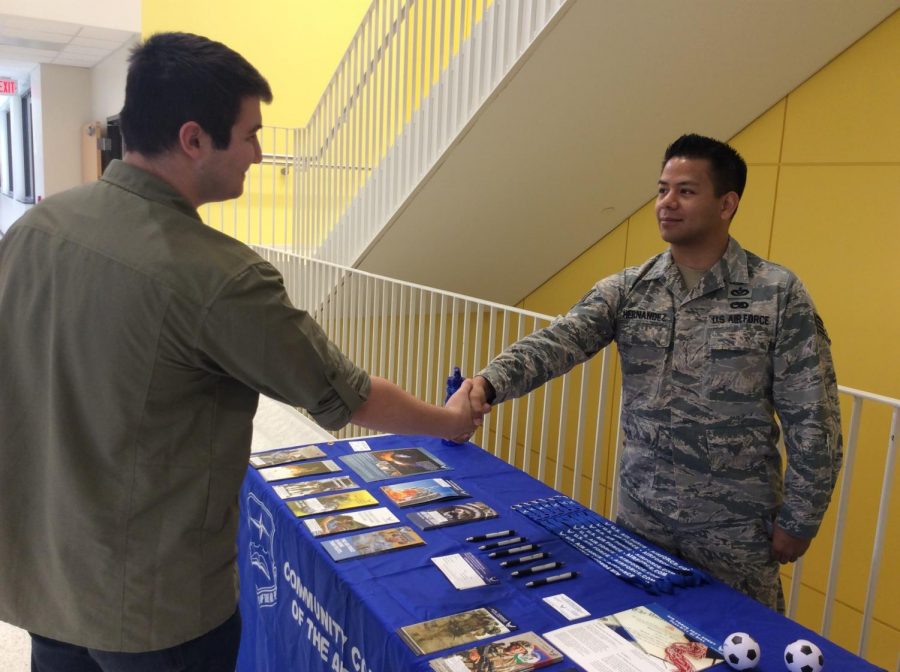Does School Recruiting Work?
Justin Defenbaugh shaking hands with Air Force recruiter Staff Sergeant Hernandez
April 5, 2019
Everyone has seen military recruiting commercials, while watching TV or YouTube they always make their way to the many screens people use everyday. It starts with dramatic music and scenes of heroism, people in camouflage uniforms rushing to aid in an emergency as a bold, powerful voice talks about courage and strength, and to be great like these people come join their team, and the logos come up at the end displaying Air Force, Army, National Guard, Navy, Air National Guard, or Marines.
These commercials are one of the ways the military tries to recruit new people into the service, but commercials are easy to ignore and brush off, and recruiters need other ways to get people to join. Instead of using the same commercial over and over made for mass audiences to see, recruiters also use more personal methods of reaching out to people, like making visits to high schools.
Recruiters from every branch of the military visit high schools in order to make connections with students and try to get them to join the military, as their title implies, but many people decide to join the military on their own, and decide to join after they have left high school, so are school recruiters really effective?
There are a number of students from Johnston, past and present who have enlisted in the military, or are on route to and they all have different reasons for joining. Many of them enlisted for family reasons and have a long family history of being in the military or have just always aspired to join the military.
Brandon Martinez ’21 has a family history of being in the Marine Corps, and that is what made him want to join the Marines. “My grandpa was in the Marines so that’s what influenced me for the Marines, but I’ve always wanted to be in the military” Martinez said. Martinez still did talk to recruiters at school just to weigh out his options but ultimately are not what influenced his decision to join the military.
Jeremiah Steinfeldt ’18 who joined the Marine Corps, has been wanting to join for a long time. “I’ve wanted to join since I was a kid. I would’ve joined no matter what and a recruiter didn’t influence my decision,” Steinfeldt said.
Most of the time students have pre-determined decisions and influencers to join the military other than recruiters. However it was the exact opposite for Cecilia Santana ’18. “I don’t think I would have joined the military if I hadn’t talked to the Air Force recruiter, and it’s the Marine recruiter who made me decide Marine Corps” Santana said.
During her senior year she was not even considering military as a career, but she talked to an Air Force recruiter who convinced her to see what it is like, so Santana went to the recruiting station. The recruiting station has offices for all the branches including the Marine Corps, and it was here she talked to a Marine recruiter who influenced her to ultimately join the Marines.
Jason Homard who has been a recruiter for eight months talks to many kids from nine different schools. He goes to each of the nine schools at least once a month and always gets a decent amount of kids to talk with him. Out of the nine schools, he has recruits from seven of them but there are students who talk to him at every school. “Most of my recruits start their interest in high school, and have an idea of joining by the time they graduate” Homard said.
How often he visits schools varies depending on their size, “It’s important to visit all my schools but how often I visit each school usually deals with how many students are at the school and how many students I’ve talked to. If I have a school with a lot of kids that come and talk and are interested, I want to visit that school a little bit more than some of the others” Homard said. Schools with more students will generally have more students that are interested in talking with recruiters so bigger schools are visited more frequently.
Overall the percent of people who join the military solely because they talked to a recruiter at high school is a small percent, but even though its a small percent, the actual amount of people is very significant. With how many people recruiters are able to bring in, the numbers positively affect our military which would mean school recruiting is very affective.





